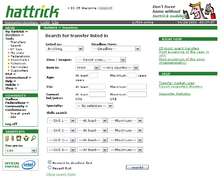Hattrick
| Hattrick | |
|---|---|
|
| |
| Developer(s) | Hattrick Limited |
| Platform(s) | Browser game |
| Release date(s) | August 30, 1997 (V.1) |
| Genre(s) | MMOG |
Hattrick is a browser-based massively multiplayer online football management game developed in Sweden and started in 1997. Currently the game contains 128 different countries, each with its own league pyramid, and 53 different language versions. As of 21st August 2015, the community of the game has about 314,000 users, each with their own team, but the number has been steadily declining (currently losing up around 350 users a day) since it peaked in February 2009 with almost one million users.[1] Hattrick has arranged 57 seasons as far as December 2014 (each of which lasts about four months).
The game is free to play, though there is an optional premium supporter service that provides additional features, as well as a mobile service, both available by in-game purchase. As with any manager game, the player must assign positions to the players and choose among some basic tactical and strategic options. According to third-party web analytics providers Alexa and SimilarWeb, Hattrick is rated as the 360th and 584th most visited website in Italy respectively, as of July 2015.[2][3] SimilarWeb rates the site as the most visited fantasy sports website globally, attracting almost 4.6 million visitors per month.[3][4]
Gameplay

The basic idea of Hattrick is to manage a football team wisely, whether it be in buying and selling players, setting the team's lineup, or expanding the arena to the perfect size. Every user in Hattrick has a team of his/her own. The user has wide control over their team, and gameplay is mainly limited by economic and tactical restrictions. Many different types of teams exist within Hattrick; the team's type is generally shaped by the training program set up by the user, as well as the formations played. Each included country has a league, which is divided into series. The series below the main divisions are also groups, where teams play each other in two legs, the number of sets and groups are defined according to the number of users in the country. Each included country also has a national cup that is played by all teams through a knockout system. The winners of the top division and cup of each country gain spots in the Hattrick Masters. If one team is champion of the crown and major league, it is the sole representative of its country. The countries with the largest number of users are Argentina, Denmark, Germany, England, France, Italy, Poland, Mexico, Finland, Sweden and United States. Though Hattrick is free to play, the game has an optional, premium upgrade.
Development
In April 2012, Hattrick Holdings was purchased by Zattikka, a casual gaming developer based in the United Kingdom, as part of its strategy to acquire established but "under-exploited" online games.[5] As a preparation for the sale to Zattikka, the developers declared that they won't improve core features of the game for the foreseeable future (postponing the announced new staff system for instance), but instead focus on improving the experience for newbies coming into the game, as well as attracting new members and adding things (like hattrick gears) that users can pay for. The philosophy to not be able to pay for success still stands. In August 2013 the old owner group of Hattrick (which includes HT-Johan and HT-Daniel) reached an agreement with Zattikka to buy back the game.
Reception
Hattrick has been studied academically, for example being used in a University of Helsinki case study into whether online simulation games, such as Hattrick, could be used as a business model for online betting and gambling businesses.[6] The conclusion was "Online gambling on simulated sport events is a very interesting proposition with good prospects in the future; further research and piloting projects are however needed before one can give any conclusive answer to the actual future value of such services."
It has also been used as the basis for a Lund University academic paper, "Time Extraction from Real-time Generated Football Reports",[7] presented at the Nordic Conference of Computational Linguistics in Tartu, Estonia, 2007. The paper proposed sorting events in football match reports, per sentence, based on a classification scheme (e.g., result-change, save, finish, pre-finish) and implemented the approach in proof of concept tool. For Swedish, the approach was better than naively assuming that events occurred in the same order as they appear in the match report.
References
- ↑ van den Hoek, László (February 2012). "Graphs" (PHP). Maptrick. Retrieved 2012-04-16.
- ↑ "hattrick.org Site Overview". Alexa. Retrieved 1 August 2015.
- 1 2 "hattrick.org Analytics". SimilarWeb. Retrieved 30 July 2015.
- ↑ "Top 50 sites in the world for Sports > Fantasy Sports". SimilarWeb. Retrieved 1 August 2015.
- ↑ Lunden, Ingrid (16 April 2012). "Europe’s Zynga? Social Games Co. Zattikka Raises $20M On AIM, Buys Hattrick, Concept Art House And Sneaky Games". TechCrunch. Retrieved 16 April 2012.
- ↑ New Business in Computer-mediated Communities. (Helsinki, 2004) (Patrik Ajalin, Tomas Granö, and Kaj Nyberg) Available: http://www.cs.hut.fi/~rsarvas/Sarvas_etal_NewBusiness.pdf Accessed: 11 May 2008.
- ↑ Title: Time Extraction from Real-time Generated Football Reports (Borg, Markus) Description: Proceedings of the 16th Nordic Conference of Computational Linguistics NODALIDA-2007. Editors: Joakim Nivre, Heiki-Jaan Kaalep, Kadri Muischnek and Mare Koit. University of Tartu, Tartu, 2007. ISBN 978-9985-4-0513-0 (online) ISBN 978-9985-4-0514-7 (CD-ROM) pp. 37-43. Available: hdl:10062/2516 Accessed: 13 May 2008.